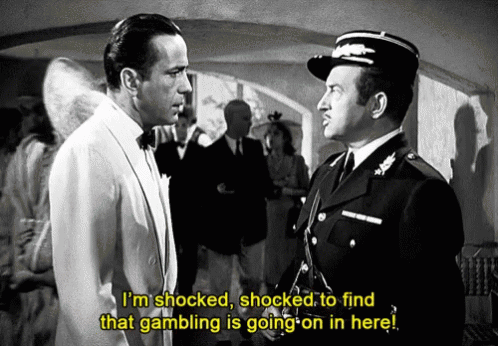Student Found Guilty of Cheating Sues Virginia Tech
Plus, shareholders sue Chegg. Plus, random data sets in exams can limit cheating.
Issue 83
To subscribe to “The Cheat Sheet:”
To share “The Cheat Sheet:”
Student Who Cheated Sues Virginia Tech University
News in Roanoke is that a student at Virginia Tech University, having been found guilty of cheating by the school’s honor system, has sued the school. The unnamed student is seeking to have his F grade overturned, the misconduct notation removed from his record, credit for the course he failed and damages.
We’ve seen this before.
Last April a student who had been suspended from Syracuse University for cheating, also sued (see Issue 22). In the Syracuse case, the student claimed he did not know what type of conduct was prohibited and that he was not aware he could have representation at his hearings.
In this Virginia Tech case, the student admits to using Chegg to “check his answer,” the news report says. But he says he was not cheating. The news report says the student’s professor reported “about 60 members of a computer coding class” for alleged Chegg cheating.
The suit claims that the student was denied a fair hearing by the committee of four students and two faculty, in part, because the professor who filed the case did not attend and could not be questioned.
To start, it should be obvious that Chegg is not a service for checking answers. It is a service that sells answers. And it’s just not credible that this student used Chegg - just this one innocent time - to check his work.
But the real story here is the increasingly litigious nature of academic integrity cases.
Schools are already incapable of addressing the surge in misconduct cases. In this instance, the paper notes, scheduling a hearing for this student took ten months. Adding litigation, or the threat of litigation, will increase the cost of inquires, slow their pace and - worst of all - place real disincentives on faculty and administrators to file or pursue cases.
Students know this. Their lawyers do too. Clogging the system, a skeptic would say, is as much about leverage as it is about justice. And unfortunately, students suing the very schools they attempt to defraud is going to be increasingly common.
Cheating Company Chegg Sued by Shareholders
Chegg, probably the largest and probably the least apologetic cheating company, has been sued in a class action on behalf of shareholders.
I wrote about this over at Forbes and Inside Higher Ed has a nice write up as well, though their headline is better. It says, “Chegg Accused of Cheating Investors.”
Wish I’d thought of that one.
IHE correctly reports, for example, that information about Chegg being a cheating provider is not new. IHE says:
a 2019 report from Citron Research, a company that publishes reports for investors and specializes in “identifying fraud and terminal business models” described Chegg as “the poster child for institutionalized academic cheating.”
“For lack of a better term, Chegg’s business model is now CaaS (i.e., Cheating as a Service),” the report says.
True.
Also in their story, academic integrity researcher Thomas Lancaster said,
the fact students use Chegg to cheat is hardly secret and any serious investor who did even a little bit of research prior to investing would have known this.
Also true.
When Chegg stock was up, investors weren’t complaining. Now that it has crashed, they appear shocked to discover the business was based on cheating all along.
Come to think of it, that’s my mistake. The legal challenge does not allege that cheating as a business is bad, just that no one told investors it was unlikely to continue.
Using Random Data Sets in Assessments Can Reduce Cheating
Times Higher Ed (THE) has a story on what it calls “bespoke robot-written exams” and how they can limit cheating.
That’s overselling it.
What they’re talking about is exams or assessments with random, computer-generated data sets, creating unique exams for each student.
Times Higher Ed calls the random data exams a “novel approach.” And it’s not. Though not common, many calculation-heavy exams have used random data sets for years. The article also says the process can design out cheating. Not really. Like so many cheating countermeasures, random data sets creating unique exams can limit some types of cheating but not others.
In an unsupervised, 24-hour exam window for example, even unique exams won’t stop a student from using Chegg to pay for an answer in 15 minutes. Or Photomath. Or any similar cheating provider.
What’s interesting about the article, in my view, is two quotes from Alison Hill, a senior lecturer in biosciences at The University of Exeter, who wrote about a test of random data sets in exams. According to THE,
Dr. Hill said that relying on university honour codes to halt cheating would be “completely naive”.
And, THE reported,
[Random data, unique tests] would be far more effective than some exam proctoring techniques piloted in the pandemic, such as the webcam surveillance of those sitting exams, which some students easily circumvented, said Dr Hill.
The first part is true. The second part isn’t.
As mentioned, random questions and unique exams may roadblock collusion cheating but it won’t stop contract cheating or impersonation or other types of cheating.
Note: I’ve started to add tags (#) to Issues in order make them more easily searchable. A guide to the tags is also up on “The Cheat Sheet” homepage.
Tags: #assessmentdesign #VC #HonorCodes #litigation

